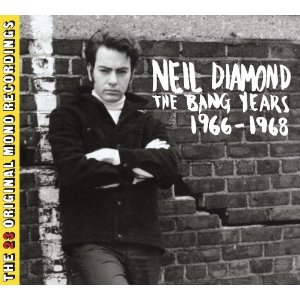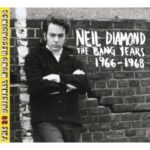
Columbia-Legacy
Before he became renowned as the bejeweled icon of overblown 70s arena pop, Neil Diamond was a struggling Brooklyn songwriter living off Woolworth’s bologna sandwiches and striving to maintain his job as a junior scribe at Leiber and Stoller’s iconic Brill Building. There he gained moderate notoriety for penning the 1965 Jay and the Americans Top 20 hit “Sunday and Me” before branching out as his own recording artist. This excellent compilation chronicles Diamond’s three years on legendary music industry impresario Bert Berns’ Bang Records label across 22 tracks in glorious mono and poetically written liner notes by Neil himself.
Working in conjunction with such studio giants as Jeff Barry, Elle Greenwich, Tom Dowd and Phil Ramone among others, it was a period that yielded some of the greatest music he ever made; songs that punctured the heart with deep, personal compositions like “Cherry Cherry,” “Kentucky Woman” and “Shilo,” giving a newfound depth to the AM dial just as the British Invasion and the West Coast psychedelic explosion were starting to permanently change the landscape of pop radio over on the FM frequency. But what really makes The Bang Years so exhilarating is hearing the early performances of Diamond originals that would go on to become hits for other artists through the years, namely “I’m A Believer”, which would go on to achieve massive success for The Monkees in 1967 (one of four songs he had written to be used by the Prefab Four, including “Love to Love”, also contained in this collection), “Red Red Wine”, a song that would later be given a reggae-tinged makeover by UB40 in 1984, “Girl, You’ll Be A Woman Soon,” so faithfully revisited by Urge Overkill on their 1992 Stull EP and later pinched by Quentin Tarantino for the Pulp Fiction soundtrack two years later and, of course, his first solo hit, 1966’s “Solitary Man,” epically transformed into an outlaw ballad by Johnny Cash on his third American Recordings album in 2000.
Also of note here are the handful of covers the man they call The Basher did himself during these Bang years, including Papa John Phillips’ “Monday Monday,” Paul Simon’s “Red Rubber Ball” (which had become a big hit for the bubblegum psych group The Cyrkle at the time), Richie Valens’ “La Bamba,” Gary U.S. Bonds’ 1960 smash “New Orleans” and a great rendition of Tommy James and the Shondells’ ’66 shack shaker “Hanky Panky.” If ever there was a need for proof as to why Neil Diamond deserves his recent induction into the Rock ‘n’ Roll Hall of Fame, look no further than this marvelous, revelatory portrait of a young man who would soon captivate the world with his “Beautiful Noise”.



No Comments comments associated with this post